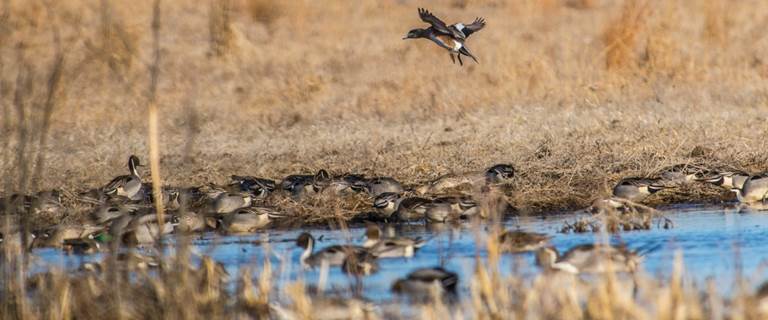Ducks Unlimited announces NRCS funding for Klamath Basin
 <
John Hoffman DU.
<
John Hoffman DU.
The Klamath Basin Farming and Wetland Collaborative RCPP, located in the Southern Oregon, Northeastern California region (SONEC), will receive $3,800,000 to implement conservation projects that provide temporary habitat for migrating waterfowl on working agricultural land.
Of wetlands located in the SONEC region, 74 percent are on privately-owned working agricultural lands. More than 6 million migratory birds rely on these working wet meadows for successful migration and reproduction each year, making flood irrigation practices on working wetlands in SONEC and the Klamath Basin especially important for sustaining waterfowl populations in North America. This RCPP offers financial incentive for landowners and agricultural producers to meet critical habitat requirements, providing short-term relief for migratory birds.
“The Klamath Basin Farming and Wetland Collaborative RCPP is an essential conservation tool recognizing the dependence of waterfowl on wetlands and Klamath Basin working lands,” said Jeff McCreary, DU Western Region operations director. “This innovative partnership brings together wildlife and agricultural partners to support waterfowl in this critically important part of the Pacific Flyway.”
In SONEC, sustained funding and ever-growing partnerships around these programs can increase the resilience of the irrigated wetland systems and support ongoing efforts to address wetland habitat drying on the Tule Lake and Lower Klamath National Wildlife Refuge. Migratory birds, as well as local agricultural communities, rely on these wetlands for survival.
“Meeting the annual life cycle needs of wetland birds in SONEC requires a whole-landscape conservation approach across public-and private-land ownerships that recognizes the needs of agricultural producers and the valuable habitat they provide,” said Joy Morris, Intermountain West Joint Venture’s Water 4 coordinator. “This RCPP demonstrates a partnership that recognizes the critical role agriculture plays for birds and the community.”
RCPP promotes coordination of NRCS conservation activities with partners to address on-farm, watershed and regional natural resource concerns. Through RCPP, NRCS seeks to co-invest with partners to implement projects that demonstrate innovative solutions to conservation challenges.
“Supporting conservation actions on private lands helps provide important ecosystem services including clean water, groundwater recharge and habitat for fish and wildlife,” said Dan Keppen, executive director of the Family Farm Alliance. “In turn, local communities benefit from agricultural productivity, making funding from collaborative, voluntary programs like RCPP critical to maintaining ecological and socioeconomic function in SONEC and the Klamath Basin.”
The Klamath Basin Farming and Wetland Collaborative RCPP will continue building on the foundation of community-focused conservation success in the SONEC region.
“The RCPP is a good example of one of these efforts because it will improve habitat for waterfowl and other waterbirds while simultaneously contributing to agricultural sustainability,” said DU Biologist Amelia Raquel.
For more information, visit www.ducks.org, and be sure to Follow DU’s Twitter feed – @DUNews1937 – to get the most up-to-date news from Ducks Unlimited.
Ducks Unlimited Inc. is the world's largest nonprofit organization dedicated to conserving North America's continually disappearing waterfowl habitats. Established in 1937, Ducks Unlimited has conserved more than 15 million acres thanks to contributions from more than a million supporters across the continent. Guided by science and dedicated to program efficiency, DU works toward the vision of wetlands sufficient to fill the skies with waterfowl today, tomorrow and forever. For more information on our work, visit www.ducks.org .
